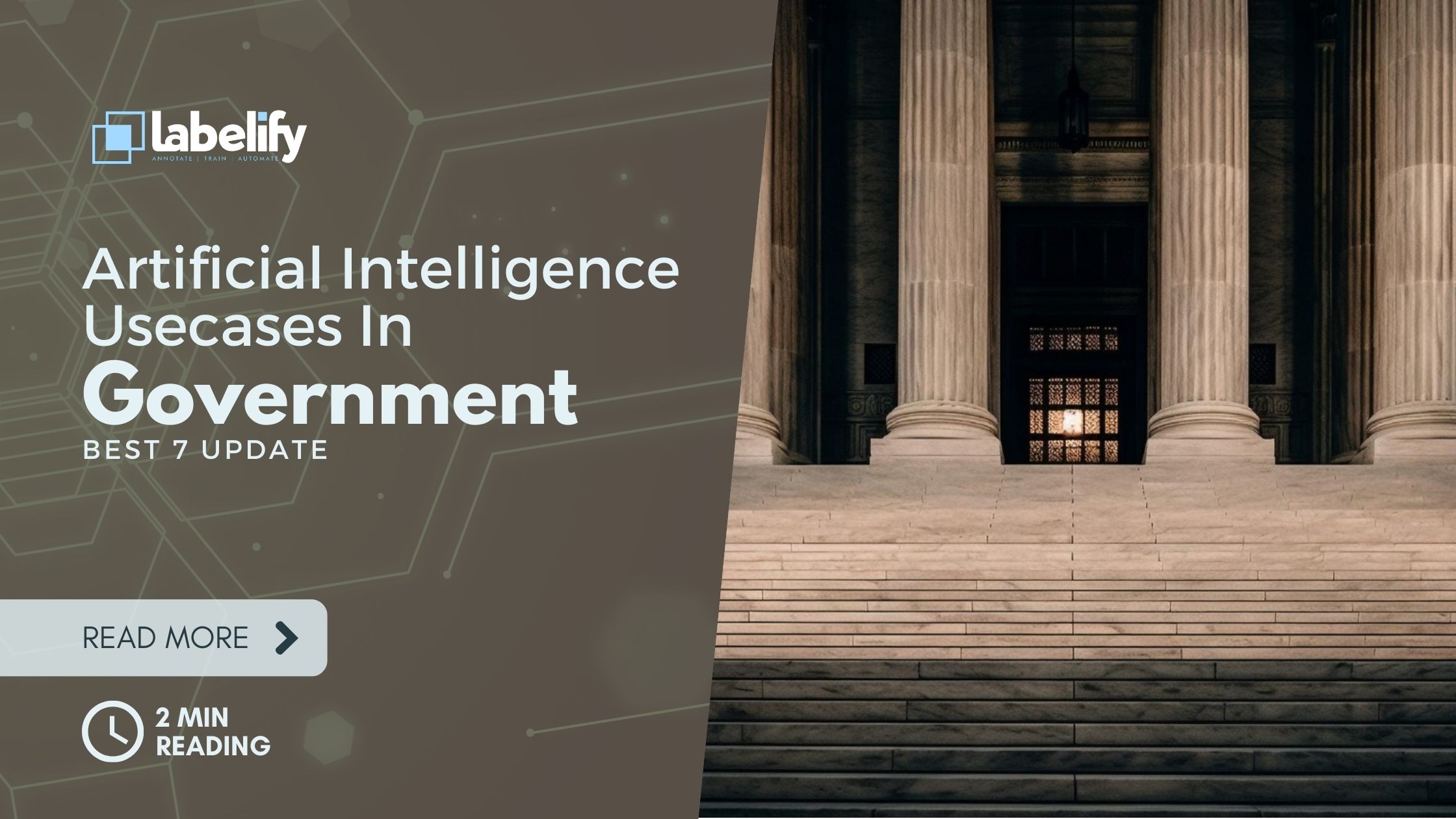In today’s rapidly evolving technological landscape, artificial intelligence (AI) has emerged as a game-changer for government operations. This article explores the practical applications of AI in various sectors, such as traffic analysis, healthcare, infrastructure monitoring, data processing, chatbot automation, and cyber attack prevention.
These advancements have the potential to revolutionize government operations, leading to improved efficiency, enhanced decision-making processes, and optimized public services.
Join us as we delve into the innovative and transformative potential of AI in government.
Key Takeaways Artificial Intelligence Usecases in Government
- AI in government can lead to significant cost savings, with estimates ranging from $3.3 billion to $41.1 billion annually.
- AI can play a crucial role in traffic flow analysis, helping to reduce road safety issues, prevent accidents and congestion, and improve overall road safety.
- In healthcare, AI enables real-time tracking of patients’ health, early disease detection, and prevention, as well as improved care for COVID-19 patients.
- AI is instrumental in large-scale infrastructure monitoring, enabling predictive maintenance, optimizing energy consumption, and reducing environmental impact.
Traffic Flow Analysis
Artificial Intelligence Usecases in Government with Traffic flow analysis is a crucial aspect of implementing AI in government. It enables the identification and management of high-risk areas, congestion, and road safety issues. Through real-time traffic optimization, AI algorithms can analyze vast amounts of data to predict and prevent accidents.
By leveraging AI tools like TranSEC and GRIDSMART, government agencies can estimate vehicle movements in real-time and track all moving objects within view. These capabilities not only improve traffic flow but also enhance road safety by alerting authorities to potential hazards and enabling proactive measures.
With Labelify’s image and video annotation tools, transportation datasets can be effectively managed. This leads to the training of robust traffic models that further aid in accident prevention.
Healthcare and Disease Spread Prevention
In the realm of healthcare and disease spread prevention, the implementation of AI in government continues to revolutionize the detection, tracking, and control of infectious diseases.
AI-enabled contact tracing has become a crucial tool in identifying individuals who have come into contact with infected individuals, allowing for prompt testing and isolation measures.
AI-based telemedicine has also gained momentum, providing remote healthcare services and reducing the strain on healthcare systems.
These innovations have proven particularly valuable during the COVID-19 pandemic, enabling healthcare professionals to monitor patients’ health remotely and manage the spread of the virus more effectively.
Large-scale Infrastructure Monitoring
Large-scale infrastructure monitoring is a critical application of AI in government, enabling real-time data analysis and predictive maintenance for efficient and sustainable infrastructure systems. Through AI tools, governments can monitor and analyze sensor data to detect anomalies and potential failures in infrastructure. This allows for proactive maintenance, reducing the risk of costly unplanned downtime and improving the overall efficiency of infrastructure systems. Furthermore, AI can optimize energy consumption, leading to energy optimization and reduced environmental impact.
To illustrate the benefits of AI in large-scale infrastructure monitoring, consider the following table:
| Application | Fordele |
|---|---|
| Predictive maintenance | Reduces unplanned downtime and maintenance costs |
| Energy optimization | Optimizes energy consumption and reduces environmental impact |
Processing Large Amounts of Data
One practical application of AI in government is the efficient processing of large amounts of data. This capability allows government agencies to harness the power of AI-driven data analysis to extract valuable insights and make data-driven decisions.
Here are four ways in which this application of AI can bring about positive change:
- Accelerated decision-making: AI algorithms can quickly analyze complex datasets, enabling government agencies to make informed decisions in a timely manner.
- Enhanced efficiency: AI tools automate data cleaning and preparation tasks, saving valuable time and resources for government workers.
- Improved accuracy: AI-driven data analysis reduces the risk of human error in data processing, ensuring higher accuracy and reliability of information.
- Enhanced transparency: By leveraging AI technology, government agencies can promote transparency by providing access to processed data and insights to the public.
With AI-driven data analysis, government agencies can revolutionize their operations and make data-driven decisions that lead to greater efficiency, transparency, and liberation for all.
Task Automation via Chatbots
Artificial Intelligence Usecases in Government for task automation via chatbots is another practical application of AI in government that enhances efficiency, improves customer service, and reduces response times. Chatbots powered by AI technology automate customer service and support tasks, providing instant responses and assistance to the public. These AI chatbots have the capability to handle a wide range of inquiries and tasks, improving efficiency and reducing response times. By incorporating AI-powered chatbots into government agencies, citizen engagement is improved, as individuals can receive immediate assistance and access information effortlessly. Furthermore, task automation via chatbots enhances accessibility and inclusivity, ensuring that government services are easily accessible to all individuals, regardless of their abilities or limitations. To illustrate the benefits of task automation via chatbots, the following table showcases the advantages of implementing AI-powered chatbots in government settings:
| Advantages of Task Automation via Chatbots |
|---|
| Improved efficiency |
| Enhanced customer service |
| Reduced response times |
| Improved citizen engagement |
| Enhanced accessibility and inclusivity |
Incorporating AI-powered chatbots in government agencies not only streamlines processes and services but also ensures that citizens have access to timely and accurate information, promoting transparency and trust in government operations.
Cyber Attack Prevention
To bolster cybersecurity measures, governments are turning to AI to detect and prevent cyber attacks with greater efficiency and accuracy. This innovative approach offers a proactive defense against evolving threats, empowering governments to safeguard their critical infrastructure and protect sensitive data.
Here are some key ways AI is enhancing cyber attack prevention:
- AI powered threat intelligence: AI algorithms analyze network traffic and identify suspicious activities, providing real-time insights into potential threats.
- Proactive defense mechanisms: AI tools enable governments to detect and respond to emerging cyber threats, minimizing the impact of attacks.
- Enhanced detection capabilities: AI algorithms can quickly identify patterns and anomalies in network behavior, allowing for early detection of potential attacks.
- Real-time threat mitigation: AI-powered systems can autonomously respond to cyber threats, implementing countermeasures in real-time to prevent further damage.
With AI’s advanced capabilities, governments can stay one step ahead of cyber criminals and ensure the liberation of their digital infrastructure.
Anvendelse af kunstig intelligens i regeringen
In order to optimize government operations and enhance citizen services, the incorporation of AI technologies has become a key focus for many governments worldwide. Two significant aspects of AI in government are exploring ethical implications and enhancing public safety.
When it comes to exploring ethical implications, AI in government raises important questions about privacy, bias, and accountability. The use of AI algorithms to make decisions that affect citizens’ lives requires careful consideration to ensure fairness, transparency, and protection of individual rights.
In terms of enhancing public safety, AI has the potential to revolutionize how governments manage and respond to threats. AI-powered surveillance systems can detect and analyze patterns to identify potential risks and prevent criminal activities. Additionally, AI can assist in disaster response by providing real-time data analysis and predictive capabilities, enabling governments to take proactive measures to safeguard citizens.
As governments continue to adopt AI technologies, it is crucial to strike a balance between leveraging the benefits of AI and addressing its ethical implications to ensure the well-being and liberation of citizens.
Ofte stillede spørgsmål
What Are Some Specific AI Tools or Technologies Used in Traffic Flow Analysis?
In the field of traffic flow analysis, specific AI tools and technologies are utilized to enhance traffic prediction and congestion management.
These innovative solutions employ AI algorithms to analyze and interpret large volumes of data, enabling real-time estimations of vehicle movements and tracking of all moving objects within view.
How Has AI Impacted the Detection and Control of Diseases Like Covid-19?
AI has had a significant impact on the detection and control of diseases like COVID-19. It has enabled real-time tracking of patients’ health, early disease detection, and prevention. AI tools, such as the National COVID-19 Chest Imaging Database (NCCID) and AI tools in the NHS, have improved care for COVID-19 patients.
Additionally, AI has streamlined disease tracking and reporting, aiding initiatives like the U.S. Centers for Disease Control and Prevention’s tool for polio virus tracking. Its role in contact tracing has been instrumental in controlling the spread of the virus.
How Does AI Help in Monitoring and Managing Large-Scale Infrastructure Projects?
AI plays a significant role in monitoring and managing large-scale infrastructure projects. With AI in project management, governments can monitor real-time infrastructure data, enabling predictive maintenance and improving efficiency.
AI tools analyze sensor data to detect anomalies and potential failures, optimizing energy consumption and reducing environmental impact.
By leveraging AI in infrastructure maintenance, governments can ensure the smooth operation of critical systems and enhance overall infrastructure resilience.
This innovative approach revolutionizes traditional infrastructure management practices and empowers governments to make data-driven decisions for sustainable development.
What Are Some Challenges That Government Agencies Face in Processing Large Amounts of Data?
Data management challenges and AI adoption hurdles are common obstacles that government agencies face when processing large amounts of data. The sheer volume and complexity of data make it difficult to efficiently analyze and extract insights.
Additionally, the adoption of AI technologies may require significant investment, technical expertise, and organizational change.
However, by overcoming these challenges, government agencies can harness the power of AI to streamline data processing, enable data-driven decision making, and enhance the efficiency and effectiveness of their operations.
How Can Ai-Powered Chatbots Enhance Customer Service and Support in Government Agencies?
AI-powered chatbots have the potential to greatly enhance customer service and support in government agencies. By leveraging AI-driven automation, these chatbots can provide instant responses and assistance to the public, improving efficiency and reducing response times.
With their ability to handle a wide range of inquiries and tasks, AI-powered chatbots offer a convenient and user-friendly interface for customer engagement. They can streamline processes, provide accurate information, and free up human resources for more complex tasks, ultimately enhancing the overall experience of government services.
Konklusion
In conclusion, the integration of Artificial Intelligence Usecases in Government operations has immense potential in revolutionizing various sectors.
From traffic flow analysis and healthcare to large-scale infrastructure monitoring and cyber attack prevention, AI offers practical applications that enhance efficiency, decision-making processes, and public services.
With the ability to process vast amounts of data, automate tasks, and provide real-time insights, AI is set to transform government operations, leading to improved governance and enhanced public services.




